Best Melatonin Supplements of 2021

Most of us don’t have any idea how important sleep is until we find ourselves lying awake at night staring at the ceiling. In some cases the causes of sleeplessness may be as simple as drinking too much coffee. But in other cases the cause may be more elusive (1).
Regardless of the “whys” however, people still need to get enough sleep and most are understandably wary of using barbiturates or opioids to do so. Enter melatonin. Melatonin is a naturally occurring hormone that’s responsible for that drowsy feeling you get late at night. And millions have found supplementing with melatonin to be a safe and effective method of getting the sleep they need.
Here are the 10 best melatonin supplements on the market today.
1. Nature Made Melatonin
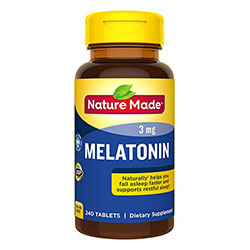
What we love about Nature Made Melatonin is that it doesn’t come saddled with a rash of unnecessary add-ons and it doesn’t provide so much melatonin that it might make it difficult to drag yourself out of bed in the morning. What you get is a moderate dose of 3 mg of melatonin per capsule and nothing else.
Nature Made has the added advantage of being a known quantity, as the company has a well-deserved reputation for producing all kinds of high-quality supplements. 3rd party testing of Nature Made Melatonin has determined that each capsule contains exactly what it says it does with no hidden chemicals or questionable fillers. If you’re looking for a safe and effective melatonin supplement, we found that Nature Made is the best.
2. Puritan’s Pride Super Strength Melatonin
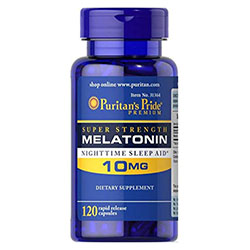
If you’ve tried a modest dose of melatonin like that provided by Nature Made and found it wanting you may need something a bit more potent. Puritain’s Pride Super Strength Melatonin is just that. Each gelcap provides a whopping 10 mg of melatonin. And if that’s not enough to send you off to dreamland it may be time to consult your doctor.
With Puritan’s Pride the emphasis is squarely on delivering the melatonin you need to get to sleep so there are no superfluous vitamins or minerals thrown in just to impress. Puritan’s Pride is another well-established supplement manufacturer with a well-regarded reputation and all of their supplements are produced in their Good Manufacturing Practices-certified facility. There are no artificial ingredients, colors, flavors or fillers and no genetically modified organisms (GMOs) are involved in the manufacturing process.
3. Just Potent Melatonin
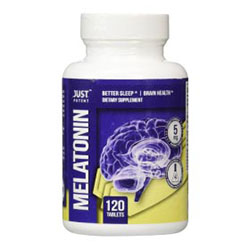
If you are having a hard time getting to sleep and you don’t have time to experiment with low dose melatonin capsules try Just Potent Melatonin. The name really says it all here as each capsule provides you with a hefty 10 mg of pure, pharmaceutical grade melatonin so you can get the shut eye you need to be your best. There’s nothing in the formulation here that’s going to present any problems.
No artificial flavors or fillers. And no questionable add-on ingredients. What there is besides the aforementioned melatonin is a modest amount of vitamin B6 which is included to help bolster brain function. Beyond that, these capsules are completely free of GMOs, free of artificial ingredients and produced in the US to exacting standards.
4. NOW Supplements, Melatonin

You’ll find NOW supplements on a lot of “top 10” lists because they’ve been producing potent, reliable dietary supplements for more than 50 years. Their melatonin is another example of how to do a supplement right. Each capsule provides a moderate amount of melatonin (5 mg).
That’s enough to help most people feel drowsy and drift off, but not so much that you might still be a bit drowsy when you wake up in the morning. What we like about that is that you can tailor the dosage to the situation. If you haven’t been able to sleep in a few days, take 2 capsules. If you just need a little help dozing off now and then just take 1. All NOW supplements are produced in their GMP facility under FDA supervision.
5. Natrol Melatonin Time Release Tablets
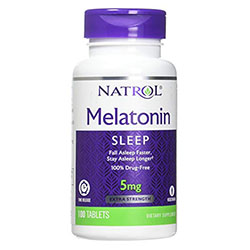
Natrol assumes you just need a bit of help now and then to get to sleep. And so each one of their vegetarian capsules contains modest 5 mg of pharmaceutical grade melatonin along with 10 mg of vitamin B6. As we mentioned above vitamin B6 is known to facilitate brain function.
It’s included here presumably so that when you wake up in the morning you don’t find yourself in a melatonin induced brain fog. Although in reality that’s unlikely to happen with a modest dose such as this. Still, it’s nice to have and who couldn’t afford to be a bit more mentally sharp? Natrol melatonin is also time-released, which helps ensure that once you get to sleep you stay asleep.
6. Physicians Choice Natrem Sleep Aid
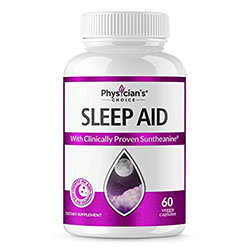
The Physicians Choice in this case is to swaddle their melatonin in a slew of secondary ingredients designed to help you enjoy a higher quality of sleep. Those secondary ingredients include pyridoxal-5 phosphate, valerian root powder, l-theanine and chamomile powder. Our testing indicated that any benefit from those ingredients would be extremely difficult to quantify.
So why is the product on our list? Because it does as good a job as any other 5 mg melatonin capsule at putting you to sleep. And at the end of the day that’s really all that matters, isn’t it? Physician’s Choice is guaranteed to be GMO free and all their supplements are produced in their GMP-certified facility in the US.
7. Source Naturals Sleep Science Melatonin
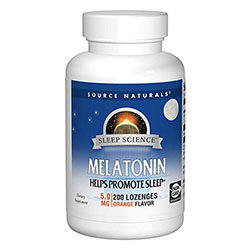
Source Naturals takes the tried and true route with their Sleep Science Melatonin supplement. There’s a middle of the road 5 mg of melatonin, buttressed by the inclusion of vitamin B6. The melatonin helps your drift off to sleep in a natural fashion while the B6 helps prevent groggy mornings. The company seems a bit concerned that their capsules may dissolve before you swallow them.
At least that’s the only reason we can come up with for the fact that they include orange flavoring and the sweetener sorbitol. We, however, didn’t have any issues with the capsules going down nice and easy with water. So we never got to enjoy the orangy taste. Oh well.
8. GNC Melatonin
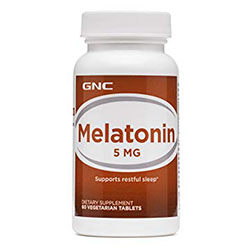
GNC is well-known for their strength training supplements. With their Melatonin supplement they acknowledge that even bodybuilders need a good night’s sleep. Don’t get us wrong though. GNC Melatonin is not targeted strictly at weight lifters.
Anyone can enjoy its benefits. The amount of melatonin provided here is a modest 5 mg, which should be enough for most people and provides you the option of taking 2 if you feel the need. Beyond the melatonin however, you won’t find any superfluous vitamins or minerals, no artificial colors or flavors, no eye of newt. For GNC it’s all about the melatonin. And that’s how it should be.
9. Nature’s Bounty Melatonin
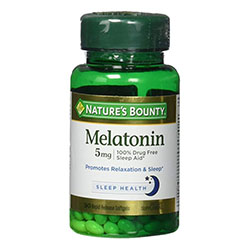
Nature’s Bounty are another supplement manufacturer that’s been around a long time and has a hard-earned reputation for producing quality products. So it’s unlikely you’re going to have any issues with the effectiveness of this product.
The company provides you a moderate dose of 5 mg of melatonin, which will be more than adequate for most people. Maybe the only potential downside here is that the melatonin is suspended in soybean oil. So if you have a sensitivity to soy you’re going to want to take a pass.
10. Vitafusion SleepWell Melatonin Gummies
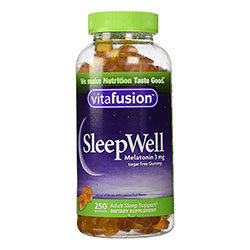
Our last melatonin supplement is this one from Vitafusion. The company takes a slightly different approach to the standard melatonin supplement choosing to deliver their melatonin in the form of a chewable gummy cap. But that’s not the only thing that sets Vitafusion SleepWell Melatonin apart from the competition.
Because, whereas most melatonin supplements provide 5-10 mg per tablet or capsule what you get here is a very modest 1.5 mg per gummy. So, while Vitafusion goes out of their way to print the word “adult” on their label, the fact is that both the delivery method and dosage make this a good choice for kids. As long as they take it under strict adult supervision.
FAQs
What is Melatonin?
Melatonin is a hormone produced by the pineal gland that plays an important role in a range of bodily functions, including the regulation of sleep cycles. Under normal circumstances the pineal gland of a healthy individual will increase melatonin production beginning around sunset and then begin ramping back melatonin production once the sun comes up. This linking of melatonin production to the rhythms of nature serves to regulate your body’s internal clock and maintain normal circadian rhythms (2).
Melatonin levels tend to decrease significantly as we age. Which is one reason many older individuals complain of insomnia. But, as we’ll see in a moment, the potential benefits of melatonin extend far beyond some restful shut-eye to encompass a range of health issues both great and small.
What are the Benefits of Taking Melatonin?
Although primarily known as a sleep inducing supplement melatonin provides a surprising range of other benefits, including:
- Protection from oxidative stress – That’s a fancy way of saying melatonin is a powerful antioxidant. Antioxidants are the body’s one and only defense against the scourge of free radicals. Free radicals course through every nook and cranny of our system undermining cellular integrity, promoting cellular atrophy and basically making us look and feel old. Antioxidants like melatonin provide a natural defense against free radicals.
- A stronger immune system – Melatonin has been shown to bolster immune function (3) which in turn helps us repel invasive organisms, prevent disease and beat back the signs of aging. A healthy immune system is one of the keys to long life.
- Faster recovery from jet lag – One of the biggest downsides to travel is trying to reset your body clock to the local time. Melatonin can help you get to sleep you need to fend off the worst effects of jet lag and enjoy your vacation to the fullest.
- Enhanced cardiovascular health – One of the most important benefits of melatonin is its ability to enhance cardiovascular health (4). It does so by way of its antioxidant qualities as well as its anti-inflammatory capabilities. In short, by fending off free radical activity it prevents cardiovascular degeneration.
- More effective digestion – Recent studies indicate that melatonin can play an important role in establishing and maintaining a healthy gut. In fact research indicates it may play a key role in the treatment of Irritable Bowel Syndrome or IBS (5).
- Possible relief from migraines – Studies seem to indicate that many people who suffer from migraines have low levels of melatonin in their blood (6). The exact mechanism by which low melatonin levels may trigger or contribute to migraines is not yet fully understood but what’s been learned so far is very promising for people who suffer from this vexing condition.
- Lowers blood pressure – High blood pressure is a common health problem that has eluded an outright cure in spite of decades of intense research. Still, there are some compounds that can help treat the symptoms of high blood pressure and melatonin is one of them (7). Many doctors now recommend melatonin supplements as part of a larger treatment regime for their high blood pressure patients.
- Healthier eyes – Melatonin may have an important role to play in cataract prevention (8) and is also known to prevent the degeneration of cone cells in the eye that are key to color identification. It’s also thought to play a role in the function of nerve cells that transport visual information to the brain. And it may even help reduce the kind of excessive eye pressure associated with glaucoma.
- Enhanced insulin function – It’s looking more and more like melatonin may play a key role in maintaining proper insulin balance in your blood. Recent research indicates a correlation between reduced insulin levels and the onset of Type II diabetes, particularly in women (9). While there is not yet enough evidence to state categorically that taking melatonin can prevent diabetes it seems like it may only be a matter of time before health professionals draw that conclusion.
- Potential Alzheimer’s treatment – It’s long been known that melatonin levels increase when the sun goes down as a way to prepare our body and mind for sleep. It’s also known that melatonin production decreases as we get older. But recent studies have discovered that melatonin levels in Alzheimer’s patients are typically only about half what they are in non-Alzheimer’s patients of the same age (10). Because sleep disturbances are often a symptom of Alzheimer’s it would seem to make sense there would be a correlation between low melatonin levels and the onset of Alzheimer’s Disease. And that, by extension, effectively treating those sleep disorders may in fact, help fend off the development of Alzheimer’s. Still, more study is needed on the subject.
- Enhanced thyroid function – The thyroid gland plays an important role in metabolic processes and produces many of the hormones your body uses to regulate functions like heart beat, breathing and more. Research now suggests a direct correlation between melatonin production and thyroid function (11). Meaning that those suffering from reduced thyroid function benefit from taking supplemental melatonin.
- Alleviate symptoms of PMS – Recently published studies indicate that low melatonin levels may have a hand in the onset of PMS in some women (12). Researchers found that some women who experienced premenstrual syndrome had significantly reduced melatonin levels at night and during those times when their PMS symptoms were at their worst.
How do I Determine the Right Melatonin Dosage?
There is no one-size-fits-all dosage when it comes to melatonin. Each person is different and, as of this writing, the FDA considers melatonin a supplement. Therefore they haven’t issued any guidelines with regards to dosing. As such, if you’re using melatonin to treat a specific condition you’ll need to discuss it at length with your doctor first.
That said those taking melatonin for preventive purposes, rather than as a treatment for a specific condition or conditions, should simply follow the dosage recommendations on the product label. Unless they have some compelling reason not to.
Is it Safe to Give Melatonin to Children?
This is a question that is being asked more and more often these days as parents look for safe, non-narcotic ways to help their children get the sleep they need. The answer is that there is a lot of evidence to suggest that some children may benefit from melatonin supplementation. These include children that typically have a hard time getting enough restful sleep. Such as those with ADHD or autism (13).
When it comes to administering melatonin to other children the effects are not as easy to quantify. Although most medical professionals agree that there is, as of this writing, no real compelling reason not to use limited melatonin supplementation if a child is having difficulty getting to sleep.
Still, any parent conducting their own research on the internet is bound to come across some conflicting information. For instance, Australian authorities consider melatonin use among children to represent an alarming trend (14). In their advisory Australian researchers site the alleged potential for melatonin supplements to harm children later in life. Although there is no current evidence to suggest that such a risk potential exists.
The preponderance of medical opinions tend to agree that giving melatonin to children to help them sleep presents no currently known quantifiable risk. Therefore it’s pretty much up to parents whether they wish to do so. While that’s not exactly a ringing endorsement it’s about as close as most doctor’s will come considering the relative lack of clinical studies conducted on the subject.
Does Melatonin Have Any Side Effects?
Melatonin supplementation is considered to be generally safe for healthy adults. It is also completely non-addictive. Even so, it is usually recommended that it be taken only if a person is having difficulty sleeping or if their doctor has prescribed it to treat a particular condition. That’s because large scale, long term studies on the effects of daily melatonin supplementation are lacking. And anytime that is the case you should proceed with caution. Still, the limited amount of clinical data that is available suggests that it’s possible some people may experience one or more of the following side effects:
- Headaches.
- Lightheadedness.
- Nausea or upset stomach.
- Dizziness.
The one effect most people will want to experience when they take melatonin is drowsiness. And because there is a very good chance you may indeed feel drowsy after taking it you should not take melatonin if you plan on driving or operating any type of machinery or engaging in any type of potentially dangerous activities.
It is also possible that melatonin may, in some instances, interact poorly with certain medications. Therefore if you are taking any of the following medicines you’ll want to discuss it with your doctor before taking any amount of melatonin:
- Oral contraceptives.
- Anticonvulsants.
- Anticoagulants.
- Immunosuppressants.
- Insulin or other diabetes-related medications.
The Bottom Line
Melatonin is a little known natural compound that may turn out to play a key role in the treatment and prevention of a large number of health conditions. Of course, melatonin supplementation is also considered to be a safe and effective way to help people suffering from various types of sleep disorders.
Any of the melatonin supplements on the above list should provide the benefits you’re looking for. Just remember that if you intend to take melatonin to treat a specific condition – or if you are currently taking other medications to treat other conditions – it’s important that you talk to your doctor first.
Check out NutritionDietNews top pick here.


0 Comments